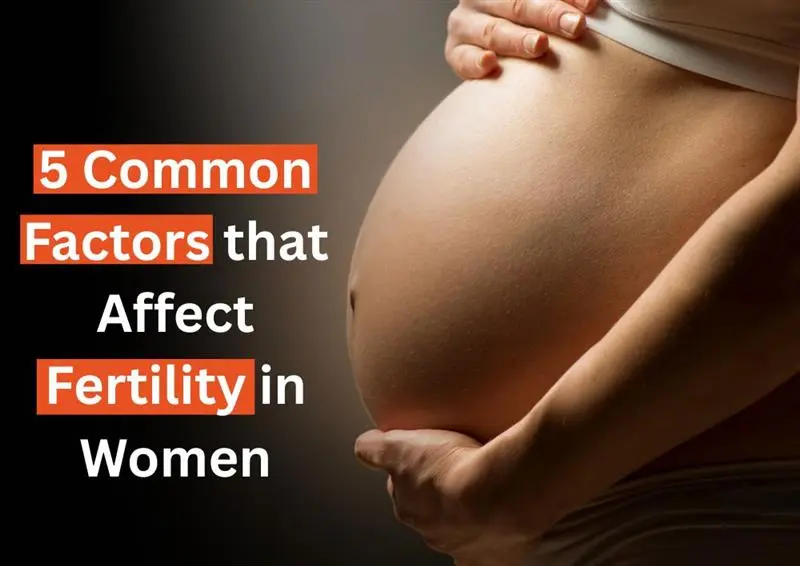5 Common Factors that Affect Fertility in Women
Sumary: Fertility in women is influenced by several key factors such as age, hormonal balance, lifestyle choices, medical conditions, and ovulation health. Understanding these elements can help in identifying possible causes of delayed conception. Early awareness, timely diagnosis, and the right treatment approach can improve the chances of a successful pregnancy. Small lifestyle changes can also make a big difference in reproductive health.
Overview
Trying to start a family but the pregnancy test keeps coming up negative? It is expected to feel confused, anxious, and even frustrated when pregnancy doesn’t happen as quickly as expected. But it is true that fertility is influenced by numerous factors. Understanding the determinants of fertility can help you take the right steps toward achieving a healthy pregnancy. At Miracles Fertility & IVF Clinic, Gurgaon, our fertility experts believe that early awareness is key. So, to create awareness, in this blog, we will explore the five main factors that affect fertility in women, along with practical solutions.
1. Age
One of the most significant factors for fertility problems in females is age. A woman is born with all the eggs she will ever have, but both their quantity and quality gradually decline with age.
-
Female fertility is at its peak in the 20s and early 30s.
-
Once you become 35 years old, both the quality and quantity of your eggs begin to decrease at a faster rate.
-
By the early 40s, the chances of natural conception significantly decrease.
Dr. Aarthi Mani, the best fertility doctor in Gurgaon at Miracles Fertility & IVF clinic, says: “Many women are delaying motherhood due to career or personal reasons. While it’s okay to plan your life your way, we encourage women to stay informed about their biological clock. Techniques like egg freezing can help preserve fertility for the future.”
2. Hormonal Imbalance
Hormones regulate your menstrual cycle and ovulation. An imbalance can disturb the regular release of eggs, making it harder to conceive.
Common hormonal disorders:
-
Polycystic Ovary Syndrome (PCOS)
-
Thyroid dysfunction (hypothyroidism or hyperthyroidism)
-
High prolactin levels
Signs of hormonal imbalance:
-
Irregular or missed periods
-
Sudden weight gain or loss
-
Acne or unwanted hair growth
-
Mood swings or fatigue
Blood tests can identify these imbalances. Based on the cause, doctors may suggest fertility treatments, including medication, lifestyle adjustments, or hormone therapies.
3. Lifestyle Factors
Your everyday habits significantly impact your reproductive health. An unhealthy lifestyle can reduce fertility in slight but serious ways.
Factors that negatively impact fertility:
-
Smoking and alcohol use
-
A poor, and unbalanced diet
-
Being underweight or overweight
-
Chronic stress
-
Lack of physical activity or excessive exercise
How to improve your fertility naturally:
-
Opt for a nutritious diet that includes a variety of fruits, vegetables, and whole grains.
-
Exercise moderately (30 minutes a day is perfect)
-
Maintain a healthy body mass index (BMI)
-
Avoid alcohol, smoking, and recreational drugs
-
Practice stress management through yoga, meditation, or journaling
- Even little modifications in your lifestyle can make a big difference over time.
4. Medical Conditions That Affect Fertility
Certain gynecological and systemic medical conditions can also interfere with the ability to conceive.
Common conditions include:
-
Endometriosis: It is a condition where tissue resembling the uterine lining grows outside the uterus, leading to discomfort and potential fertility challenges.
-
Fibroids: Non-cancerous growths that can affect either the uterus or block fallopian tubes
-
Pelvic Inflammatory Disease (PID): Caused by untreated STIs, and leads to scarring of reproductive organs
-
Chronic illnesses like diabetes or autoimmune disorders
These conditions can often go unnoticed until they start causing problems. Regular gynecological checkups and early diagnosis are key to managing them effectively.
5. Ovulation Problems
Ovulation, the release of an egg from the ovary, is necessary for achieving pregnancy. If a female is not ovulating regularly, it can make conception difficult.
Signs of ovulation problems:
-
Missed or irregular periods
-
No signs of ovulation including mid-cycle cramping, change in cervical mucus
-
Very short or long menstrual cycles
Causes of ovulation disorders:
-
Stress
-
Low body weight or extreme dieting
-
Thyroid dysfunction
-
Excessive exercise
Doctors may recommend ovulation predictor kits, ovulation calculator, ultrasound monitoring, or blood tests to track ovulation. Medications like Clomiphene Citrate or hormone injections may be prescribed if needed.
When Should You See a Fertility Specialist?
If your age is less than 35 years and have been trying to achieve pregnancy for over 12 months, or if you are over 35 years and have tried for 6 months, now it is time to consult a fertility expert. A proper evaluation not only detects the root cause but also opens the door to timely treatment. “Whether it is lifestyle counseling, ovulation support, or advanced procedures like IUI and IVF, we design personalized treatment plans that bring real results,” says Dr. Aarthi.
Conclusion:
Fertility challenges can be emotionally and physically exhausting. However, understanding the underlying factors and seeking professional help can make a world of difference. Whether you need help managing PCOS, tracking ovulation, or exploring assisted reproductive techniques, consult an experienced fertility specialist near you at Miracles Healthcare for compassionate care to help you start your family.
Frequently Asked Questions
Maintain a healthy weight, manage stress, eat a balanced diet, and avoid smoking, alcohol, and excessive caffeine.
A woman is most fertile during ovulation, usually 12 to 14 days before her next menstrual cycle.
Fertility can be assessed through blood tests, ovulation tracking, ultrasound, and other evaluations by a fertility specialist.
Factors include late marriages, urban lifestyle, stress, career priorities, and increased prevalence of infertility-related conditions.
Foods like leafy greens, berries, nuts, whole grains, avocados, and full-fat dairy can support female fertility.








.webp)







Was the information useful?
0 0